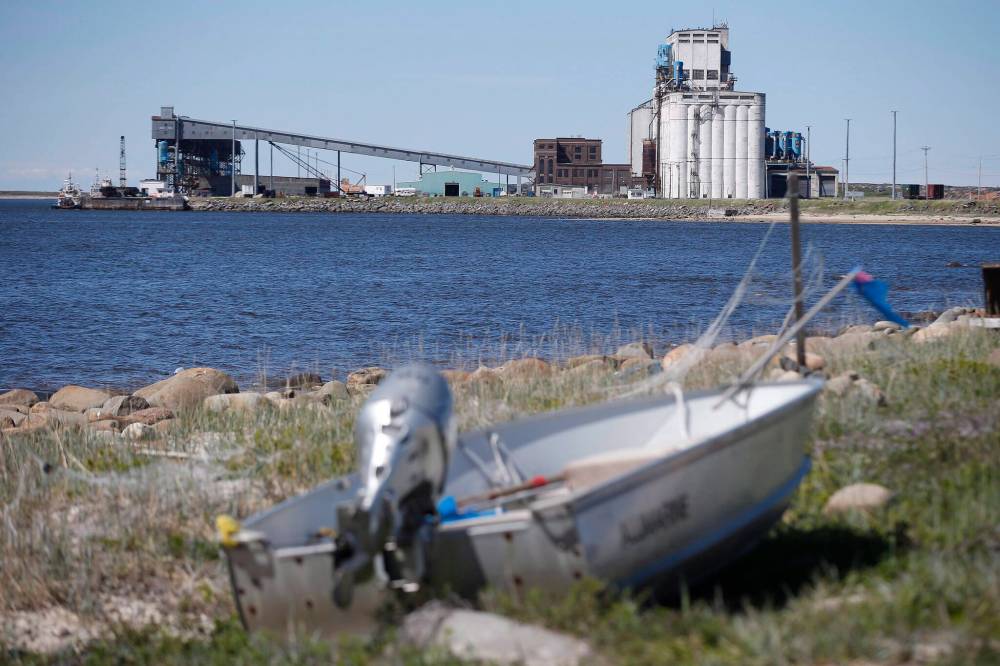Finding opportunities for Churchill
Advertisement
Read this article for free:
or
Already have an account? Log in here »
To continue reading, please subscribe:
Monthly Digital Subscription
$0 for the first 4 weeks*
- Enjoy unlimited reading on winnipegfreepress.com
- Read the E-Edition, our digital replica newspaper
- Access News Break, our award-winning app
- Play interactive puzzles
*No charge for 4 weeks then price increases to the regular rate of $19.95 plus GST every four weeks. Offer available to new and qualified returning subscribers only. Cancel any time.
Monthly Digital Subscription
$4.99/week*
- Enjoy unlimited reading on winnipegfreepress.com
- Read the E-Edition, our digital replica newspaper
- Access News Break, our award-winning app
- Play interactive puzzles
*Billed as $19.95 plus GST every four weeks. Cancel any time.
To continue reading, please subscribe:
Add Free Press access to your Brandon Sun subscription for only an additional
$1 for the first 4 weeks*
*Your next subscription payment will increase by $1.00 and you will be charged $16.99 plus GST for four weeks. After four weeks, your payment will increase to $23.99 plus GST every four weeks.
Read unlimited articles for free today:
or
Already have an account? Log in here »
Hey there, time traveller!
This article was published 24/03/2023 (1013 days ago), so information in it may no longer be current.
Manitoba is the only Prairie province with access to the sea, making us unique. Because of this, the existing Port of Churchill has recently garnered increasing attention. (Changing tides? Jan. 21).
But Churchill is not an ideal port site. Physically, it is relatively inaccessible and remote, 300 kilometres north of Gillam, isolated from existing infrastructure. Transportation connections remain tenuous, given travel over tundra and permafrost.
The area is also environmentally sensitive, limiting infrastructure and the nature of suitable products.

The Port of Churchill in Manitoba is the only access Prairie provinces have to the sea, but it’s not an ideal site. (John Woods/The Canadian Press files)
That said, Churchill is currently all we have. The federal government recently provided some funding to support the rail line and port, but is silent on directions toward a viable future. The federal Liberals appear to have no ideas and nothing to offer.
How can we then make best use of Churchill, based on sensible and realistic opportunities?
Most important to recognize is that the port was designed primarily around handling bulk solids, not massive bulk liquids, nor bulk gases, and certainly not large quantities of dangerous goods of any sort.
Students from my fall course in supply-chain management identified one reasonable new opportunity, namely potash, an inert fertilizer. Nutrien, in neighbouring Saskatchewan, is the world’s largest potash producer. Russia and ally Belarus together are second-largest. Given the outrageous invasion of Ukraine, there is increasing pressure to displace Russia on this critical mineral. Nutrien has the capacity, but is limited primarily by port constraints, hence a possible fit with Churchill.
Recent discussions on Churchill, as noted, however, centre on energy, but are mostly unrealistic with one very notable exception.
Crude oil via Churchill, whether by pipeline or rail, is obviously not a good idea, based not just on environmental risks, but high costs for a suitable pipeline.
Natural gas is not a great choice, either. There are fewer risks associated with such a pipeline, but expensive facilities are needed. This is amply illustrated by the as-yet-uncompleted LNG Canada project in British Columbia (upwards of $40 billion and counting).
NDP Leader Wab Kinew has called for hydrogen exports, alluding to recent announcements in Newfoundland and Labrador. Such a suggestion is naive and unrealistic. Hydrogen might be renewable, but as a dangerous good, caution is needed for any such project in the North. Further, the costs of production and liquefaction would be exorbitant.
The proposal for Newfoundland and Labrador itself appears to be mostly hype, with suggested export of 250,000 tonnes annually by 2025, but with neither wind farm nor facilities yet underway. At such scale, a project here would require annually more than 12,500 GWh, over 40 per cent of Manitoba Hydro’s total output, and consume more than two billion litres of high-purity water. Using recent U.S. and European cost estimates, the resulting price of hydrogen here would need to be excessively high, in the range of $10 to $15 per kilogram, not viable in world markets.
My colleague Barry Prentice has suggested production of renewable ammonia instead. This is an intelligent solution to address the low-density transport problem of hydrogen, and a valuable product in its own right.
It is, however, also a dangerous good. Producing renewable ammonia might be useful to consider, just not prudent to send via Churchill. Massive new port infrastructure also would be needed.
This leaves one interesting and potentially realistic opportunity, one uniquely championed by Conservative Leader Pierre Poilievre. Poilievre has been criticized for his comments on Churchill, but to a significant extent unfairly. A key point acknowledged by Free Press columnist Dan Lett is that a major focus regarding Churchill has been “CanaPux,” an eminently positive idea to consider.
CanaPux are produced using a novel process developed at the University of Calgary, which involves removing diluent from bitumen, then combining waste plastics to produce a solid briquette. The resulting bulk-solid is easier to ship around, does not pollute and is quite difficult to ignite; it even floats.
It could be readily shipped to Churchill via the existing railway and would require little if any modification to the port infrastructure. The timeframe also could be relatively near-term.
A bonus is that the company commercializing the CanaPux process is Wapahki Energy, a First Nations company based in Alberta. This Indigenous connection is important, given the rail line and port are owned and operated by a consortium of First Nations partners too. Arctic Gateway Group is also aware of CanaPux.
Interestingly, it is Poilievre who has raised this opportunity for Churchill. NDP Leader Wab Kinew and federal minister Dan Vandal, despite both having strong Indigenous connections, appear to be asleep at the switch on this matter.
We need sensible opportunities for Churchill, and CanaPux appears to be worth consideration.
Robert Parsons, PhD, MBA, is a sessional instructor teaching on topics of sustainability economics, quantitative methods, and supply chain management at the I.H. Asper School of Business, University of Manitoba.


